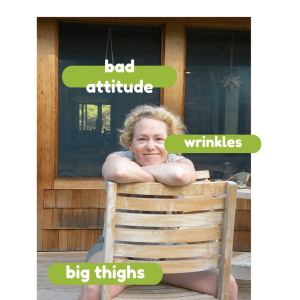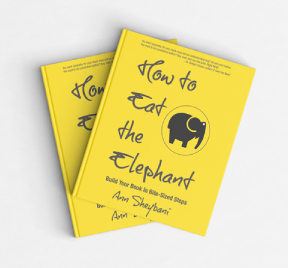Writing
Haters Are Gonna Hate
May 4, 2015
I was 26 the first time I realized that what people thought about me had more to do with them, then with who I was/am as a person. Such an epiphany should have freed me up; unfortunately it didn’t.
When I’d first moved to Iran, I wanted two things more than anything. First, I wanted my husband to love me above all else. Second, I wanted to be liked by his people.
I equated being liked with being safe. I figured that, if Hakim’s family liked and accepted me as one of their own, it would make it all the easier for him to do the same.
The product of emotionally constipated, thin-lipped Norwegians, I’d loved the idea of being part of a big, unruly family who expressed their emotions right out in the open without fear of retribution. I craved me some passionate Arabs who shouted and laughed at the same time, disciplined each others kids, shared meager resources, and stood up for each other at the slightest provocation. The way they’d been described.
On our first vacation to Hakim’s home village, however, I discovered that there were just too many of these passionate Arabs for my comfort. What had sounded really good on the surface was in fact the stuff of nightmares for an introvert. Of Hakim’s six brothers and sisters, ninety-eight cousins (just on the father’s side), countless mother’s-side cousins, all of their offspring, uncles and aunts, and thirty-two nephews and nieces—I figure less than ten were absent the night we walked through that door. I’d never seen so many people crammed into one claustrophobic room. And believe me, I’d seen Soylent Green.
There I stood, Hakim’s American bride with his infant daughter, in all of my awkward glory.
To make matters worse (or better, if you take into account that, when stressed, I tend to say shit that I shouldn’t), the textbook Arabic I’d learned in college, straight out of the Koran, was about as useful there as Shakespearean English in Detroit. Except for the occasional kid, nobody seemed to be speaking Farsi, the national language I could almost manage.
Silent, eager, overwhelmed, confused as to where I should sit in a room clearly demarcated by gender, burdened by a crying infant; this was the woman I presented for inspection.
It’s been 25 years. And I can’t remember exactly how I know this. But two different women in that room looked at me and came up with very different pronouncements.
The widow of Hakim’s eldest brother took me in with the saddest, kindest eyes. “Poor thing. So far away from home. She must be horribly homesick without her mother. What a sweet girl.”
One of the cousins, a mother of five who’d once been designated as Hakim’s potential bride, decided at that same moment that I was a stuck-up American slut. “Look at her acting like she’s too good to sit with us. Who does she think she is?”
What I do remember is feeling panicked because I couldn’t yet differentiate between those whose opinion mattered, and those whose opinion mattered not.
To make my chronic insecurity worse, my husband would never fail to warn me that I needed to be pleasant and inviting to every single member of his family, no matter how far removed, or I would insult his Arab honor and force him to make an unpleasant choice. In other words, either they ALL like me, or I was out. Which, as I’ve just demonstrated, was not entirely of my control.
This past week I received a lovely e-mail with a link to Dani Shapiro’s Elle essay What To Do When The Internet Hates You? (Thank you, Jessie.) In it Shapiro explores her own history with haters and their criticism, and her journey to figure out which to take seriously, and which to ignore. You’ll want to read it in its entirety because it’s freaking good.
Particularly if you write, if you put yourself out there in public, people are going to disapprove of, not just your opinions and work; but also you. And it feels really bad. It never fails to shock and surprise. Because, nine times out of ten, you’re just guilty of walking around the planet being you.
And this is one of those big fears many of my clients face. Sometimes they don’t know how to put words to it, this amorphous sense of dread. What they do know is that something keeps getting in the way, preventing the completion of their project. Something that keeps them safe in the shadows, where no one will notice them.
I get it when people who know me don’t like me. I understand the loyalty issues, or my questionable humor, or the difference in values, or the sense that I’ve somehow let them down. I get that our energies and personalities simply don’t jive. And I can accept that. We’re cool.
But I’m going to be 52 in June, and I still have a hard time wrapping my head around the fact that haters are just going to hate. I still spend way too much of my precious time trying to figure out what I could be doing differently; what I might have said wrong. So I can go back and somehow change it.
And I’ve spent more years than I care to mention being someone innocuous enough to appeal to the masses. To avoid criticism at all cost. There’s no way I’m going back to living that way. It depleted the shit out of me.
As Shapiro says, “This is who I am in all my flawed humanity.” Take it or leave it.
If you’re wondering what you did wrong, why someone hates you for no good reason at all. If you’re afraid to put yourself out there because you know, as God is your witness, they will come, I hope these words remind you that it probably has very little to do with you, and everything to do with who they are and how they view the world.
Haters are just going to hate. May that thought free you up.




